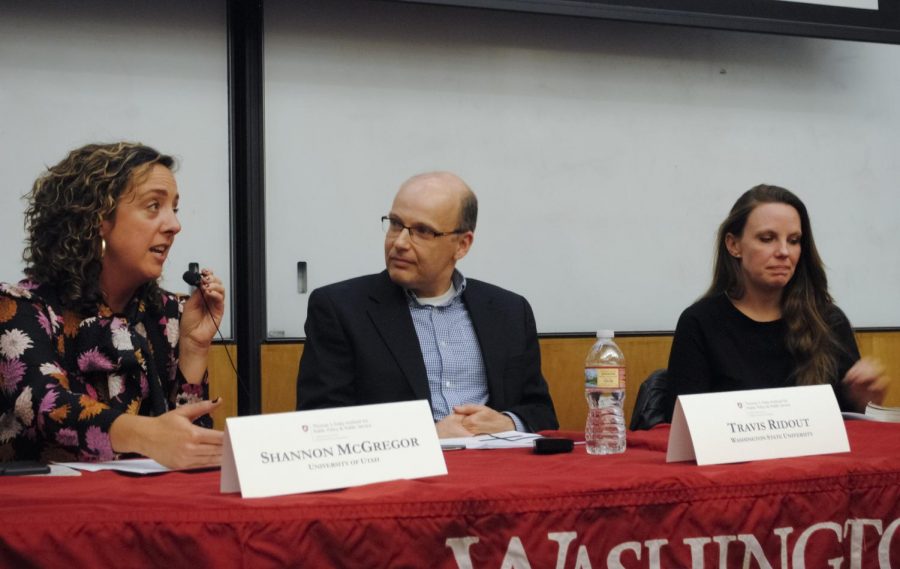Microtargeting a common strategy on social media
Marketing tactic stores data on individuals, uses it to target them
ALYSSA STANFIELD | THE DAILY EVERGREEN
A panel discusses microtartgeting in politics and in social media Thursday in Goertzen Hall.
October 25, 2018
A Foley Talk about microtargeting, a marketing strategy that collects an individual’s information and uses it to market products to them, was held Thursday in Goertzen Hall.
The panel consisted of three guest speakers: Travis Ridout, Shannon McGregor and Emily Stewart.
Ridout, a WSU professor of government and public policy, said any user of the internet has now become the product being marketed.
“Modern day microtargeting has really taken off as people have adopted emails and social media,” Ridout said. “[Social media companies] have these huge databases of information about you.”
Due to the influx of social media it has become easier to obtain data from a person or a group of people, he said. That data is sold to companies such as political campaigns who then design advertisements that will specifically target an individual or group.
“This is really the first step in the way campaigns microtarget voters,” Ridout said. “The campaign has to know something about you in order to send a message to you. [The messages are targeted to] voters based on their characteristics.”
McGregor, assistant professor in the department of communication at University of Utah, said technology firms have built themselves to look like politics.
Large tech companies have inserted themselves into the way political campaigns market and advertise to people, she said.
“While we think of these people as nonpartisan, they tend to sort themselves into partisan groups,” she said. “We need a lot of transparency about what these workings really look like.”
Stewart, a reporter for Vox, said large tech companies should not be expected to police themselves.
“You have to remember that there is not enough of an incentive [for tech companies] to [self-monitor],” Stewart said. “It’s better [for the companies] to say they’re sorry after doing the bad thing and getting caught, rather than not doing that bad thing in the first place.”
An issue with the quick growth of the companies is that it has become very difficult for the government to implement regulations, Stewart said.
“It became increasingly clear that senators do not know what Facebook does and they have no idea how to fix it,” she said. “There’s a lot of problems [with tech companies]. I don’t know how to fix them, but the government doesn’t know how to either.”
Attempting to be an informed consumer of social media is one of the first steps to understanding microtargeting, Stewart said.
Social media platforms are becoming more transparent via the search engines employed within the sites, but this effort is far from a solution, McGregor said.
“Consumers can actually track [ads and data] now. [Tech companies] did the bare minimum,” she said. “You can see the content of the ads, but you can’t see who paid for them.”
Microtargeting is mutually beneficial for both tech companies and marketing companies, McGregor said, but rarely beneficial for the individual whose information is being sold.
If microtargeting continues to grow without tech and marketing companies being held responsible for their actions, media will be led further downhill and there will be less trust in the news media, Ridout said.
“[There will be an] inability to separate fact from fiction. The spread of false information will continue,” he said. “We can regulate political advertisements, but when it comes to the spread of false information, there’s really nothing government can do to regulate it.”
False information is protected by the U.S. Constitution, Stewart said.
“Twitter does not owe you the First Amendment,” she said. “That’s only owed by the government.”









